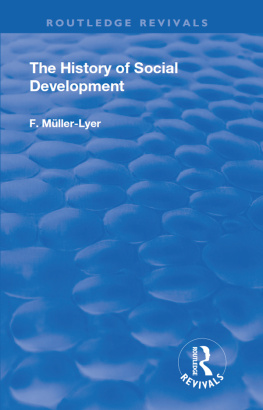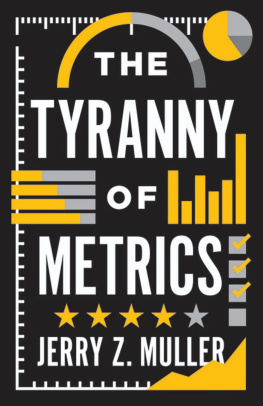Routledge Revivals
The History of Social
Development
The History of Social
Development
F. Mller-Lyer
First published in 1920 by George Allen & Unwin Ltd.
This edition first published in 2018 by Routledge
2 Park Square, Milton Park, Abingdon, Oxon, OX14 4RN
and by Routledge
711 Third Avenue, New York, NY 10017
Routledge is an imprint of the Taylor & Francis Group, an informa business
1920 Taylor & Francis
All rights reserved. No part of this book may be reprinted or reproduced or utilised in any form or by any electronic, mechanical, or other means, now known or hereafter invented, including photocopying and recording, or in any information storage or retrieval system, without permission in writing from the publishers.
Publishers Note
The publisher has gone to great lengths to ensure the quality of this reprint but points out that some imperfections in the original copies may be apparent.
Disclaimer
The publisher has made every effort to trace copyright holders and welcomes correspondence from those they have been unable to contact.
A Library of Congress record exists under ISBN: 21003479
ISBN 13: 978-1-138-61491-8 (hbk)
ISBN 13: 978-0-429-46374-7 (ebk)
THE HISTORY OF
SOCIAL DEVELOPMENT
BY
DR. F. MLLER-LYER
TRANSLATED BY
ELIZABETH COOTE LAKE & H. A. LAKE, B.Sc. (Econ.), F.R.A.I.
WITH AN INTRODUCTION BY
PROFESSORS L. T. HOBHOUSE & E. J. URWICK
LONDON: GEORGE ALLEN & UNWIN LTD.
RUSKIN HOUSE, 40 MUSEUM STREET, W.C. I
First published in 1920
(All rights reserved)
INTRODUCTORY NOTE
THE value of Dr. Mller-Lyers book is that it is a serious attempt at an Inductive Sociology. The moment that the Sociological student passes out of the region of abstractions he finds himself wandering in an uncharted wilderness of fluid and disconnected facts. His natural impulse is to take refuge in specialism. He will study some particular region of contemporary life, or of the historic past, or of the Simpler Societies, and learn what is to be learnt about that nook or corner, since the whole field is too wide for his exploration. This method produces valuable special studies, but it does not give us a Sociology. It yields no theory of the nature and development of society as a whole, it gives no account of the general trend of civilization, and answers none of the questions about progress or retrogression. But these are the questions to which more urgently than heretofore the world needs an answer. The potentialities of good and evil in civilization have been multiplied many times by the increase of human power. What are we going to make of them? What has human Progress amounted to so far as it has gone, and what can the watchman say of the night? Carlyles question, Whence, and oh heavens ! whither? is even more clamant for us than for him. Now we shall not know the future merely by recapitulating the past because the human mind is constantly introducing new factors. But neither shall we be able to guide our own future intelligently unless we understand the present and how it came to be. It is not a question of fatalistic prediction, but of focusing racial experience in a way that will throw clear and dry light on the permanent human problems. This is the task of inductive Sociology, and the first step to a solution is to find methods of distinguishing, describing and correlating the successive phases through which human societies have in fact passed. These are Dr. Lyers Phases of Culture. The merit of his work is that with the minimum of hypothetical assumption he endeavours after a scientific classification of the mass of facts which the Anthropologist, the Archeologist and the Historian proffer to the enquirer. Just as in the sciences of life theories of descent are based on morphology, so in Dr. Lyers handling are theories of social evolution. That he should be equally successful in the application of his method in all parts of his enquiry is impossible. That the method might be amended and supplemented by other methods is probable. But that it is a method to be taken into careful account is certain. Further, it is developed with a lucidity and evenness of temper which may surprise and enlighten those who imagine all German work to be crabbed, obscure and distorted by theoretical prepossessions. Mrs. Lake has done a service to students who cannot grapple with the original in offering them the present very readable version.
L. T. HOBHOUSE.
INTRODUCTORY NOTE
IN common, I think, with most teachers of Sociology, I have often felt the need of some book which should co-ordinate the general facts of social development and so furnish the student with a scheme within which to group, in their due significance, the elements of both primitive and historical civilization. The late Dr. Mller-Lyers Phasen der Kultur supplied this needbut only for students familiar with German. I therefore felt peculiarly glad when Mrs. Lake and her daughter undertook the task of translating the book into English. Those who are familiar with the original will find that the translation very faithfully reproduces both the simplicity of style and the clearness of expression which characterize Dr. Mller-Lyers writing. The book is therefore excellently fitted to serve as a basebook for English students; while the wide range of its survey and the inherent interest of the facts dealt with should make a strong appeal also to the general reader.
It is only right to add that the translators began their task in the hope that such a use of their leisure time might be of real assistance to others. Their unselfish perseverance should win the gratitude of both teachers and students of Sociology.
E. J. URWICK.
TRANSLATORS PREFACE
THE first rough draft of this translation was made for private reference in 191314, but in April 1914, as it seemed unnecessary waste to bury months of labour in manuscript notebooks, application was made to the author at Munich for the official rights of translation. The permission was readily forthcoming (Mit bestem Dank habe ich Ihre freundliche Aufrage erhalten und freue mich sehr dass Sie beabsichtigen eine englische Ubersetzung meines Buches Phasen der Kultur zu verffentlichen), but the negotiations were delayed by the exorbitant terms demanded by the German publisher, and were still unsettled at the out-break of war. The translation remained in its rough state for two or three years, but, largely through the encouragement of Professor Urwick and Professor Hobhouse, we have now devoted some months to its completion.
Even in its present form the book is almost a literal translation from the German, the paragraphs, and almost without exception even the sentences, following the German original as nearly as possible. The object of this was twofold, being in the first place to retain the character of the book as nearly as possible, and in the second place to form a convenient book of reference for English students reading the book in German.
The footnotes have similarly been translated, but since these often refer merely to authors, or in many cases give two or even three variants of the same title, we have thought it better to make a complete list of references, which is printed at the end of the book.












